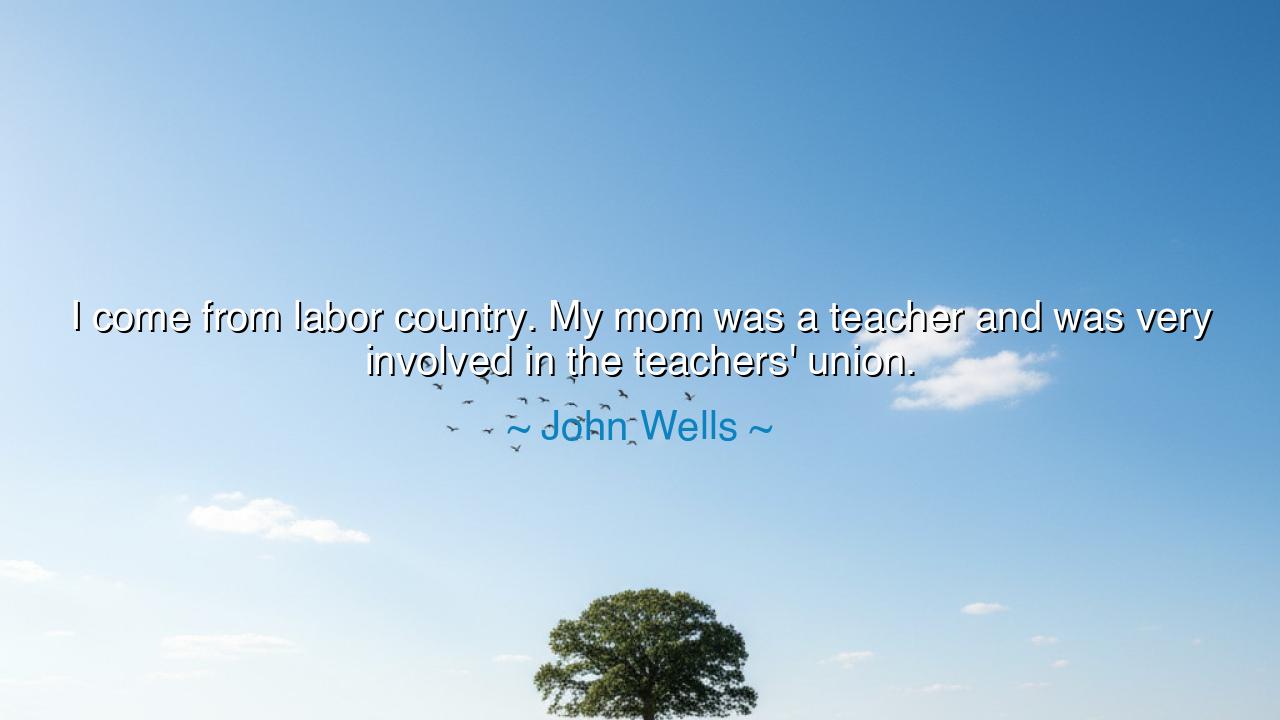
I come from labor country. My mom was a teacher and was very
I come from labor country. My mom was a teacher and was very involved in the teachers' union.






John Wells, the storyteller of screen and stage, once declared with pride: “I come from labor country. My mom was a teacher and was very involved in the teachers’ union.” These words are not merely personal memory; they are an invocation of heritage, a reminder that behind every individual stands the strength of labor, the courage of those who toil, and the endurance of those who unite for dignity. In his voice is the echo of countless generations who found honor not in crowns or wealth, but in the daily work of their hands and the solidarity of their hearts.
The meaning of his statement lies in the sacred recognition of roots. To say “I come from labor country” is to acknowledge that one’s identity is shaped not by ease or privilege, but by the sweat of workers, by the struggles of unions, and by the sacrifices of those who sought fairness in a world often bent toward exploitation. Wells honors his mother, a teacher, whose service to knowledge was bound with her service to justice through the union. For teaching was not only her profession but her banner, and in her organizing he saw the deeper truth that labor’s voice grows powerful when joined together.
The origin of such conviction can be traced to the rise of labor movements across history. In the Industrial Revolution, when workers were crushed under endless hours and dangerous conditions, unions were born as the shield of the weak against the mighty. The teachers’ unions, in particular, rose to insist that the ones who guard the minds of the young be themselves treated with respect and fairness. In this heritage, Wells’s mother stood as one among many, but her example was personal, shaping his understanding that justice is not abstract but lived out in the home, in the community, and in the struggles of those closest to us.
History gives us stirring examples. Consider the Pullman Strike of 1894, when railroad workers rose in unity against cruel conditions. Though they faced violence and repression, their courage inspired reforms that reshaped labor rights in America. Or recall Dolores Huerta and Cesar Chavez, who united farm workers in the mid-20th century, teaching them to walk out of the fields and into the halls of power. Their message was simple: that dignity belongs to all who labor, and justice is found in solidarity. Wells’s memory of his mother’s union work is a smaller thread in the same great tapestry of labor’s history, woven of courage, sacrifice, and the yearning for fairness.
Yet his words also carry a deeper lesson about identity and pride. Too often, people are tempted to hide humble origins, as though greatness must spring from wealth or fame. But Wells speaks proudly of labor country, showing that true nobility lies in honest work and the values it breeds: perseverance, humility, and courage. His declaration is a call for all to remember where they come from, to see not shame in labor but honor, not weakness in unions but strength.
The lesson for future generations is clear: cherish the dignity of work, and defend the rights of those who labor. No society can endure if it despises its workers, for it is their hands that build the houses, their minds that teach the young, their strength that keeps the wheels of life turning. To forget them is to forget the foundation upon which everything else rests. Wells’s mother, in her classroom and in her union, embodied this truth: that justice begins when ordinary people stand together.
Practical action must follow. Support the rights of workers in your communities, respect the teachers who shape future generations, and honor the labor of all — whether in factories, fields, classrooms, or homes. Remember that solidarity is not only for unions but for families, neighbors, and nations. Stand with those who struggle for fairness, and lend your voice to those who are silenced. In this way, the heritage of labor becomes not only memory but living strength.
Thus, Wells’s simple remembrance becomes timeless wisdom. To come from labor country is to come from courage, from perseverance, from the soil of struggle and the waters of solidarity. Let this be your pride also, O seeker: for whether you wield pen, tool, or plow, you too are part of that eternal brotherhood and sisterhood of labor, and in honoring it, you honor the very dignity of humankind.






AAdministratorAdministrator
Welcome, honored guests. Please leave a comment, we will respond soon